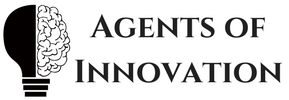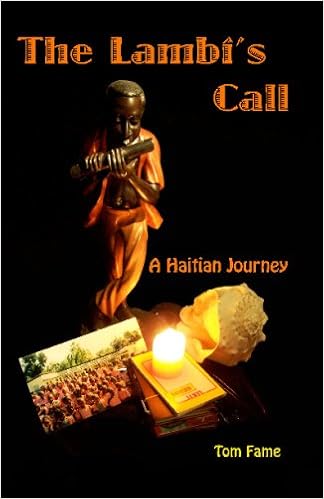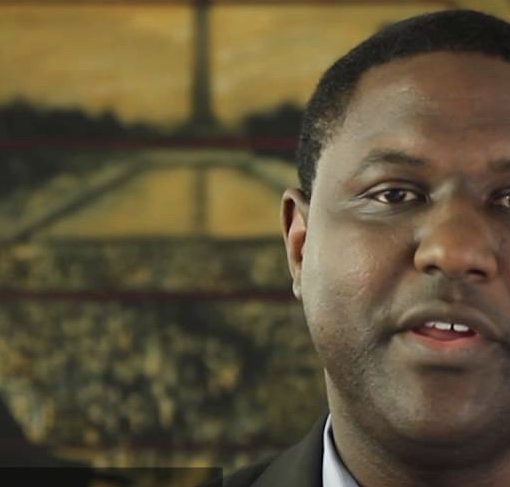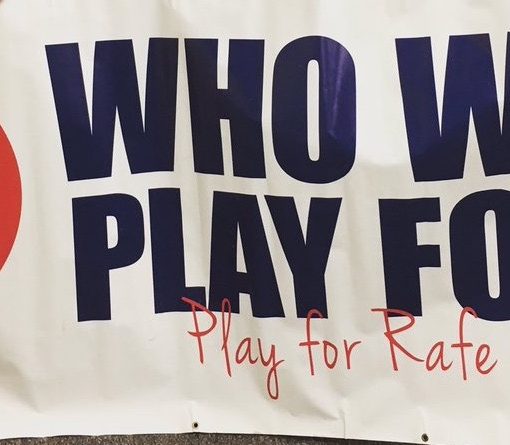Dr. Tom Fame’s Haitian Journey.
Dr. Tom Fame is a physician in Salem, Virginia. He has made over 50 trips to Haiti since his first visit there in 1995. He has overseen the O.L.P.H. Haiti Project since establishing it in 1996. He previously served as a pediatrician in the U.S. Force before having his own practice in Salem, Virginia. Dr. Fame joined us as our guest on Episode 95 of the Agents of Innovation podcast.
As a Catholic, Dr. Fame would typically volunteer about once a month at a free health clinic back in Virginia. The woman who ran that clinic invited him to volunteer at a medical clinic in Jamaica, and later in Haiti, where he first visited in 1995.

“There was something about the Haitian people,” said Dr. Fame. “Anyone who has gone to Haiti gets that bug – most people.” Dr. Fame recounted how the Haitian people “like to tell stories, they like to joke. I just felt like a connection there. It’s just a fascinating kind of a culture.”
While he enjoyed the people, on his first visit there he was so busy visiting with patients – he saw 275 kids in 5 days — he didn’t have time to get to know the people outside of the patients he saw in the clinics. He decided he wanted to do something more relational in Haiti.
Before he even went to Haiti, someone had sent him a letter. They didn’t know he was going to Haiti. But he had never opened the letter. He merely stuck it in a book and later opened it on his way back from Haiti. It said someone was coming to their parish from the Catholic Diocese in Richmond, Virginia to speak about a “twinning project” with Haiti, where some parishes in Virginia would become sister parishes with some parishes in Haiti. Most would just send money and supplies. But Dr. Fame ended up doing much more.
“I was just on fire,” said Dr. Fame. The woman who gave him that letter in 1995, Adele Della Valle-Ruth, later wrote the foreword to both of his books on Haiti, published in 2008 and 2021. The Lambi’s call is a concept based on the “Lambi,” a conch shell that the Haitian people would blow to tell people they are free.
“Haitian people are so unique,” said Dr. Fame. “It’s a little piece of Africa in Central America. It’s a different culture.” He reminded us that Haitians “were the only people who every freed themselves from slavery and then continued to have their freedom.”
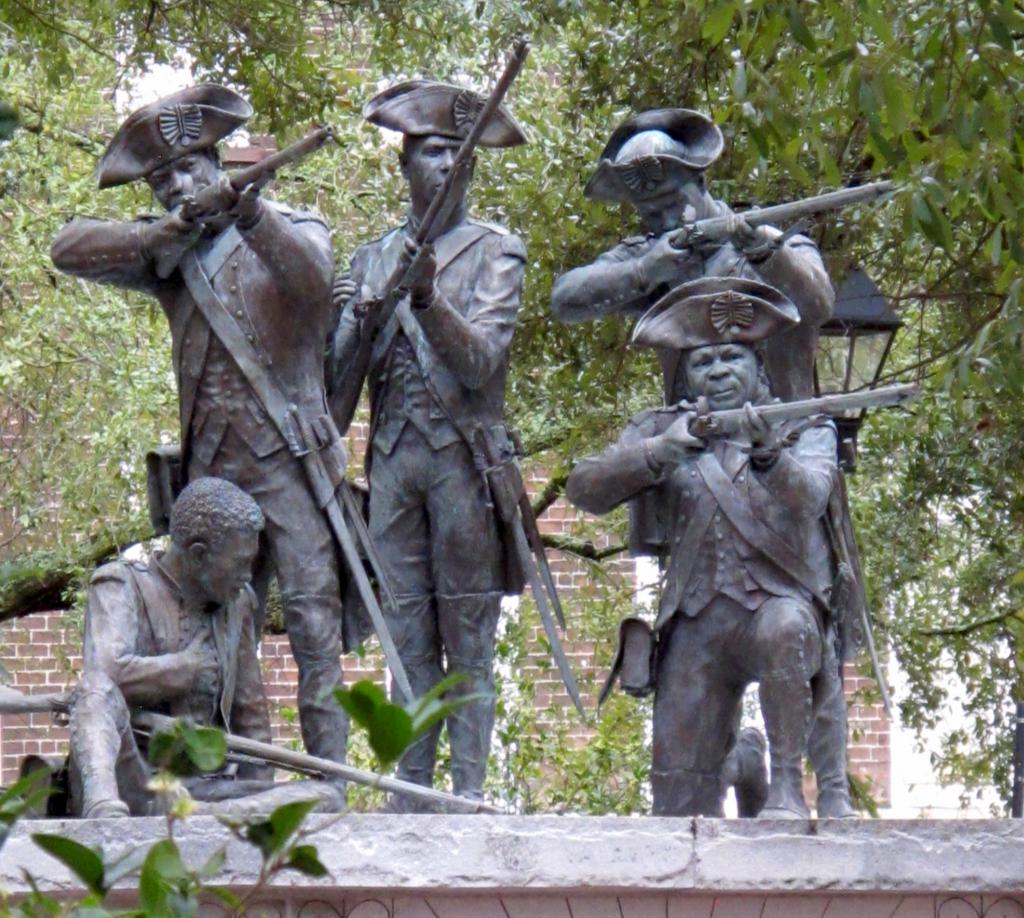
Haiti is the poorest country in the Western hemisphere and is usually listed in the top 25 countries that have issues with poor health, access to clean water, and other problems.
However, the Haitian people do have a remarkable history and the United States has benefitted from the help of the Haitian people in the past. During the American Revolution, the U.S. employed French people to help them. At that time, Haiti was a part of the French empire and Haitians helped Americans fight at the Battle of Savannah in 1779. In Savannah, Georgia today there is a statue commemorating those Haitians.
A few decades later, as Haitian slaves were fighting for their freedom and for their independence, France had its hands full. That was part of the reason that the French, under Napoleon, were so willing to make a deal with the United States that led to the Louisiana Purchase, which allowed the U.S. to more than double the size of its territory at the time.
Dr. Fame understands this history and he also sympathizes with the plight the Haitian people find themselves in today.
“The core of the whole twinning thing – for me anyway – is relationships; getting to know people,” said Dr. Fame. “The interesting thing is how the relationship has sort of guided the project.” His parish in Salem, , Our Lady of Perpetual Help, twinned with a parish in Lascahobas in Haiti.
“From a Catholic standpoint – the key to the Catholic – the source and the summit of the faith is the Eucharist, when you celebrate the mass. I kind of feel like it’s a connection – you celebrate the Eucharist at your church and you’re offering this up for everyone … when you have a twinning relationship … we are really connected with this group down here.”
For any kind of system, said Dr. Fame, “There needs to be a source of energy that sustains the system. So for an automobile, you need gasoline … the earth requires the sun … with us, it’s food.”
“With certain community projects, you want to look at the source of energy. Haiti at one time was called the NGO capital,” said Dr. Fame. “Because there’s hundreds of NGO people with projects and stuff. But what keeps those NGOs going is the outside funding. There’s stories of NGOs that do good things but then the funding dries up and they leave.”
“You need to find a source of energy that’s going to be sustainable, that’s going to stay there forever. And the source of that energy is what I call human power. The power of the individual human being is the same whether you’re American, African, European, Chinese, whatever. That human potential – that energy that is inside a human being – is the energy you want to tap into and it’s sustainable.” He added, “The people in the community – that have a vested interest – that’s the energy you gotta tap into.”

Dr. Fame has used this philosophy to try and train local Haitian leadership. “When you build up local leadership – I call it human potential – that’s the key.”
Dr. Fame recounted one day walking by the side of a metal water tank in Haiti and watching students using rocks to do their organic chemistry homework. He was amazed. And it was a sign that while they might be poor, these are not stupid people and they have a willingness to learn and move forward.
He has never understood how he could possibly find the resources to help them, but he reminded us that “If you step out in faith, it kind of keeps going.”
On a trip to Haiti, he learned the community he was working with had a desire to build a school. They wanted to employ local people to build it and teach in it. The building of the school would cost $60,000 USD. He was just one man, but when he returned to Virginia, he met with the priest at his church in Salem and asked for permission to make his case to fellow parishioners. He held fundraising dinners and meetings and people stepped up.
“It was like the loaves and the fishes,” said Dr. Fame. He needed $60,000 and the people in his parish and local community came together to raise $90,000. So, they were able to make the school a little bit bigger than originally planned. His parish priest was amazed. “He said, ‘I don’t believe it.’ I said, ‘you have to have faith.’”
Dr. Fame grew up Catholic and went to church with his family growing up. He went to a state university and occasionally attended mass. While in medical school, he had a group of people he would go to church with much more often. But then as his family grew and he had some kids, he became a little more involved in the church.
“My faith was kind of growing. Sometime around the time I went to Haiti – I think it was right after my first visit – I read a book on Saint Francis … and I love this guy! Sort of a wild and crazy kind of guy. He wanted to live the Gospel life and just went out and did it. So I became a secular Franciscan. My secular Franciscan journey is sort of parallel with my Haitian journey, they kind of compliment each other.”
Saint Francis was popular for saying, “Preach the Gospel. If necessary, use words.” Dr. Tom Fame seems to embody this. And after more than a decade of doing good works in Haiti, he finally did also use words.
In 2008 he published his first book,The Lambi’s Call: A Haitain Journey. In that book, Dr. Fame said that “Haitians have joy in the midst of unbelievable suffering.” In Haiti, about one of 10 children die by the age of six because of one of three things: pneumonia, diarrhea, or malaria. Yet, he still finds the people have incredible faith and their joy comes through in their obsession with singing and dancing.
Since 1995, Dr. Fame has seen how innovations in technology, especially in telecommunications have improved lives for Haitians. Cell phones have helped Dr. Fame to be able to stay in better touch with the people he has served, especially when he is back in Virginia. And for those people, they also have more access to information and people outside their community.
“Cell phones have been huge in public health,” said Dr. Fame. “In Africa, they have different ways to use them for monitoring things.” And now since COVID shut travel opportunities down – Dr. Fame hasn’t been in Haiti since January 2020 – he is able to stay in touch with the people there through the power of the cell phone.
But the medical system is still suffering from a lack of resources including medical doctors. “In Haiti, if you get sick, there are local people that know herbal things,” said Dr. Fame. So when it comes to treating their health, they first start “by going to a local healer. If they have money, they can go to a clinic somewhere or a hospital.”
“We are doing this public health thing now and I think it’s doing more good than a clinic with medication. I think you have to start with the foundation first,” said Dr. Fame. “We forget how important the water system in our community is. You kind of drive by this thing and some guy works at the water plant, like whatever, but if we didn’t have that, we’re in trouble.”
Dr. Fame said that one of the biggest concerns for Haiti is “public health – things we take for granted – that’s the foundation of things.” So he then went and studied public health so that he could be of further leadership for the people he loves.
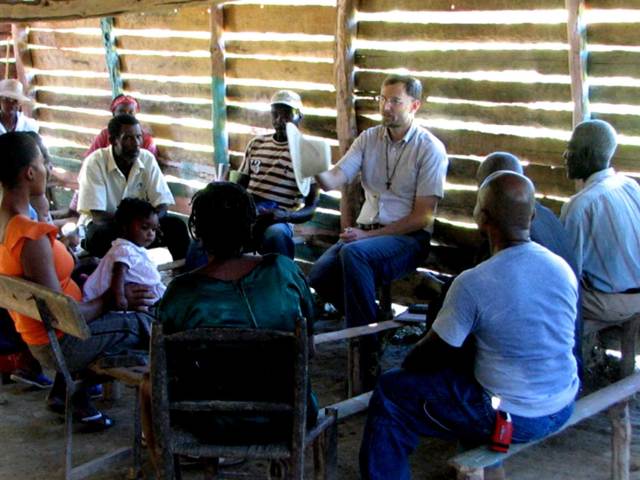
“Education is the foundation of public health,” said Dr. Fame. He cited the importance of education about nutrition and clean water.
“And now a lot of these kids that I had in my school are the ones that we are setting up businesses for. I realized a lot of them had gone to my school back in the day. Now they are older, we have sent them on to training, and they are becoming the leaders of the community. I’m building this little nidus of leadership.”
In addition, the communities he serves in Haiti’s Cabestor Valley – and beyond – are working together towards better public health care and information. They have a care group network of 120 Haitian volunteers. Each volunteer represents about a dozen households and 15 of them come together every other week to meet and share information.
“And so every two weeks we get information about what’s going on in the valley and they learn things and they spread it back out. So, it’s information in and knowledge going back out to every household,” said Dr. Fame. “If you want to make a community healthy, you have to involve the entire community, not just people just around the clinic.”
Leadership is coming into place and public health care is improving. And that school he helped start more than two decades ago is now on a path of self-sustainment, mostly due to an endowment fund he created for the school.
“My whole thing is sustainability. If I die, what’s going to happen to the teachers?,” he said. The endowment fund, which is currently worth $1.1 million, is now “creating money to pay the salaries of the teachers, some of the workers at the school, and now my health care worker. That sustains the project. That’s the source of energy that will keep going to pay their salaries.”
Dr. Fame also has taken the approach of helping the local people in Haiti help themselves. He has provided resources to help create jobs — not to take the human capital way, as so many well-intentioned volunteer groups and NGOs have done over the years. Those sorts of things lead to dependency, much of which is documented in books like Toxic Charity by Robert Lupton.
While some might view a poor country like Haiti as unsafe to travel to, Dr. Fame said, “I’ve never felt uncomfortable there. What I tried to put in the book too are stories of people, the richness of it – as opposed to what a crappy little country this is – but just the richness of the culture and the people. It’s just hard to describe unless you’ve been there.”
“The Haitians love to sing,” said Dr. Fame. “And one of the things we do in public health is we teach them songs … because a lot of these guys and gals can’t read and write, but they’ll remember the songs and that’s how they will learn what to do in a public health situation.”
There are also hundreds of Haitian proverbs and Dr. Fame incorporated many of them in his books, including his new one published in 2021, titled The Lambi’s Call: Breaking the Chains. Those Haitian proverbs are sayings “that also tells you a lot about their culture,” he said. The Haitian people are descended from France and many places in Africa and the proverbs are built on some of those cultural roots. “It’s just a way of explaining things sometimes, why bad things happen and ways to deal with things.”
Over his more than 25 years travelling back and forth to Haiti, Dr. Fame has learned some creole. He says he speaks it just ok. “I can get by but there’s things I can’t say, there’s things that I can’t express.” But he has learned enough to communicate with his friends on this Caribbean island. And he has also discovered what we can learn from the Haitian people
“There are classically four substitutes for God: It’s power, pleasure, pride, and possessions. None of them are bad in their own right, but too much power, too much pleasure, too much pride, too much possessions – if that’s what’s most worth to you … those things are never going to satisfy you. The one thing that is not a substitute for God is God himself,” said Dr. Fame. “And since [Haitians] don’t have the luxury of these four other things, all they have is their faith, and it’s so powerful, it’s so real.”
He talked about how when things have been bumpy in his own life, the faith of his Haitian friends have gotten him through.
“What has to motivate someone is love. It can’t be guilt, it can’t be some concept of ‘justice is a good thing so I’m going to be a justice warrior,’ you’ve got to really fall in love and if you love your children, you’ll do anything for them.”
***
When Tom Fame was ten years old, he started his first job working at a corner bar in upstate New York, owned by his father. “We’d go in on Saturdays and Sundays and sweep it up, clean it up, he taught us to do a good job, clean it. Later, even when I was working at the bar, he never paid us because he said. ‘hey you get food in the house.’”
Dr. Fame encourages people to follow their passion, but also to consider getting another job that pays the bills. “And don’t be afraid to make mistakes because that’s how you learn things. Mistakes are a good thing. I certainly made a lot of mistakes during this process.”
Dr. Fame admits that going to a place like Haiti isn’t for everyone. Some people can’t handle it. “There’s a certain percentage of the population – and it’s a fairly high percentage of the population, that is very risk-averse,” he said. He is not one of those people. And when it comes to Haiti, he said, “I see past the physical poverty. I see the life of the community.”
“Thinking outside the box is another thing” that Dr. Fame recommends aspiring entrepreneurs learn to do more. Of course, Saint Francis would probably advise us that Dr. Fame didn’t need to use those words to tell us he is an outside-the-box thinker. It’s pretty obvious.
You can purchase a copy of Dr. Tom Fame’s books here. All funds go to support his project. You can also watch some of his YouTube videos about his project in Haiti here. And you can learn more about those projects at: Haiti.OLPHsalem.org.
You can listen to the full interview with Dr. Tom Fame on Episode 95 of the Agents of Innovation podcast on Apple podcasts, Audible, Spotify, Stitcher, SoundCloud, or wherever you listen to podcasts (and please don’t forget to write a review on any of those platforms!) You can also follow the podcast on Facebook, Instagram, or Twitter.
For those looking to directly connect with and learn from the many guests of the Agents of Innovation podcast, please consider joining the Fearless Journeys community today!
